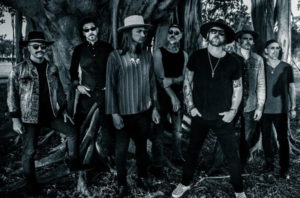A Conversation with Devon Allman and Duane Betts on Touring and Their Upcoming Debut of the Allman-Betts Band, Down to the River
Devon Allman: “We wanted to do this. We never had to do this. If we didn’t, Duane would be on his second solo record and I’d be on my tenth. We’ve all been busy the past three decades and of course there’s always been the thought of joining together and if there was the right chemistry it might happen. The time had to be right. So, it’s the right time and we have the chemistry. It’s real organic and we’re excited to get this new record out there.”

The Allman-Betts Band consists of three sons of the prominent members of The Allman Brothers Band,: Devon Allman (guitar, vocals), Duane Betts (guitar, vocals), and Berry Oakley, Jr. (bass), along with guitarist Johnny Stachela, keyboardist John Ginty, drummer John Lum and percussionist R. Scott Bryan.
The principals met as teenagers at a 1989 Allman Brothers 20th Anniversary Reunion Tour gig. Having jammed occasionally off and on throughout the years, Betts opened for the Devon Allman Project 2018 World Tour, where the now close relationship between Duane and Devon began to blossom. They began to think of joining forces, calling in their old friend Berry Duane Oakley and tapping Stachela, Lum and Bryan, all of whom had played with Betts in his solo gigs, following Betts’ departure from Dawes. Devon met keyboardist John Ginty while filming for an independent TV show, they hit it off, and Devon was able to persuade Ginty (no arm twisting required) to leave the Dixie Chicks and join the band. Originally, Peter Levin, who plays on the album, was going to be part of the band, but family concerns didn’t enable him to tour. Ginty joined after the recording with Levin handling keyboards for most of the album, while former Allman member Chuck Leavell plays piano on “Good ‘Ol Days.”

Photo: Chris Brush & Smoking Monkey Photo
We caught Devon and Duane on a break from a grueling schedule that has them touring on 200 dates. Curious how they balance the demands of fans who want to hear Allman Brothers tunes when they have their own material, I pointed out that the last tune played, their own album’s title track, drew a great response.
Duane responded, “We hear a great reaction to the new songs every night and look forward to playing more of the album now that it’s almost out there. “It is a balance of making people happy and doing more of your own stuff. We think we have it and the balance will move to more of the album going forward. We’ll always play two or three of our dads’ songs though.”
Devon agreed that finding the right balance isn’t difficult at all, and elaborated: “We draw from four buckets: our record, tipping our hats to our dads, mine and Duane’s solo material, and our own heroes. When asked about dealing with rowdy requests, Devon said, “I don’t mind it, I know how to deal with it; we have fun with it. Sometimes we may even respond with, ‘We ain’t a damn jukebox.’”
Devon spoke more about the chemistry between himself and Duane when reflecting on his time with another group they shared, Royal Southern Brotherhood. “It was the first time I was in a band when I wasn’t the leader. It helped me step back and let other cats have their say. This band looks to me and Duane as leaders and I have the utmost respect and trust in Duane for song decisions, band decisions, and even interviews like this. We’re brothers in music. There’s never ego. People probably look to me as the main vocalist and Duane as the main guitarist, but it might be 60-40. Now that Berry is getting comfortable with the band, he’ll probably sing one or two on the next album.”
Duane echoed, “It flows, we let the song decide whose voice fits best,” and indicated that guitar choices are made the same way. Indeed Devon takes the vocal lead on five numbers, Duane on three, and the two share the final track, “Long Gone.”
Duane mentioned that he had been working with musicians in Alabama prior to working with the Allman-Betts Band, and the Muscle Shoals Studio name often came up regarding where to record next. It was in his conscious and subconscious mind. When he and Devon agreed to work with “go-to” producer and expert in vintage equipment and analog recording, Matt Ross-Spang, the group chose Muscle Shoals. Devon indicated it could have been Electric Ladyland or any number of studios that had analog recording, but both reflected on how vibe is still in the room and that the spirits of their heroes still linger presently in Muscle Shoals SOUND. It all played into the experience.

About the album, Devon said, “We wanted a classic mid-’70s sounding album but with a freshness to it that Matt helped us get. We tried not to overdub too much.” Duane echoed, “We’re not making a modern rock record.” He described the songwriting as collaborative between himself, Devon and writer Stoll Vaughan, who they flew in on three separate occasions. Recording, done live, took six days with four or five songs being the core, extending to a dozen, from which nine were chosen for the album. Some combination of Devon, Duane and Vaughan have writing credit for most songs the album.
The Down to the River (BMG) kicks off with that legacy sound of guitars bouncing off the B3 backdrop on the opener, “All Night.” The Betts-Vaughan co-write “Shinin” has Duane on lead vocals and the familiar dueling guitars, with Stachela on a piercing slide. The brief Allman-Adler co-write “Try” follows with signature soulful vocals in the forefront, abetted by background vocals and swirling organ and punchy guitar riffs. Next is the crowd-pleasing title track with Devon again in the lead for one of his best vocals, as the others chime in with their soulful exclamations and economical guitar breaks that stretch out (as do many) in live performance.
“Autumn Breeze,” the album’s longest track at eight minutes plus, features Duane on the vocal lead, and, as the song unfolds, it has those familiar jazz-like guitar-organ sequences that hearken back to their forebearers, with strong interplay between Betts and Stachela again, reminiscent of the great guitar lines from “In Memory of Elizabeth Reed.” Allman takes another soulful turn on his rootsy, melodic, penned “Good ‘Ol Days” with Stachela’s tasteful slide and Levin’s ever present organ underpinning the groove. The guitar-driven “Memories and Melodies,” already a live staple, finds Duane in the lead, with a wealth of background vocals and crisp soloing from Duane. It’s one of the album’s standout tracks due to its eminently memorable chorus and raging guitar support.
The tip to their own heroes comes with Devon’s laid-back but terrific take on Tom Petty’s “Southern Accents” with Pete Levin delivering gorgeous piano and Stachela hitting just the right notes. The closer, “Long Gone” also begins in piano-driven style, with Devon and Duane exchanging vocal leads and combining for a riveting chorus that at one point goes a capella before the band brings it to rousing conclusion. It’s the perfect closer to a well-thought-out album that finds the proper balance between emotional playing and restraint.
Sure, there are echoes of the dads. That’s a given, but there are no outright covers. And, as Devon says, “It goes beyond the fact our dads were in a famous band and supersedes the whole ‘sons of’ thing. We’re a band, and we’re going to make sure everyone recognizes that.”
Or, as Duane says about the legacy they want to leave, “We’d like them to say, ’They gave us their all every night.’ We want to make people feel good and leave the show smiling, feeling lighter than they did before hearing us.”
Talking to them, their chemistry is instantly credible. They’re excited and are off to an auspicious start.
—Jim Hynes







Be the first to comment!